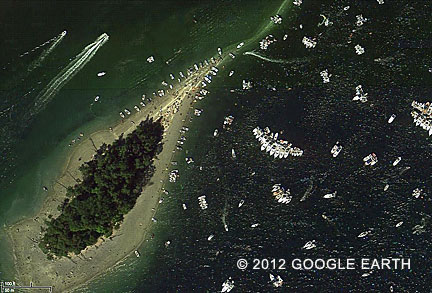MMPA
Seal pups relocated to remote island for their safety
Sep/02/20 08:25 AM
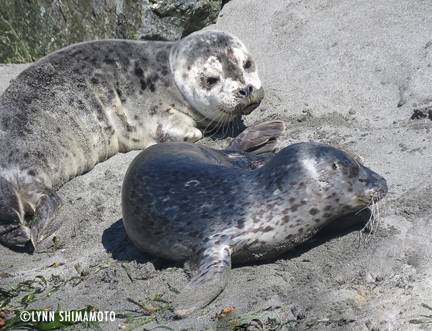
Over the past days, the pups, nicknamed Foxtrot (L) and Tango (R), had been coming and going from the highly visible and accessible public beach next to a popular pier, trying to get much-needed rest. The very busy Alki Trail runs next to that beach along the seawall, with stairs leading directly to the sandy nook the pups were using. Volunteers set up a tape perimeter during daylight and early evening hours when the pups were onshore, but still people were observed crossing the tape to access the beach or look at the seals, despite clearly marked signage.
When Seal Sitters became aware the pups were returning late each night for a few more hours rest, the stairs were blocked off with signboards and tape to protect them. It was obvious, however, that people were breaching the perimeter overnight and going down onto the beach. When Responders checked in the early mornings to see if the animals were on shore, they found commingled seal tracks, human footprints, dog prints, litter and human excrement despite double rows of tape, cones and barriers that had been put across the steps. It is against federal law, the Marine Mammal Protection Act, to harass (disturb, touch, feed, move or otherwise harm) seal pups.
Seal Sitters’s hotline began to receive troubling reports of people touching and harassing the pups, ignoring warnings from passersby and barriers the few times SSMMSN First Responders were not present. Due to COVID restrictions and facemask requirements, Responders are under strict guidelines to have limited contact with the public at a minimum 6 foot distance whenever possible.
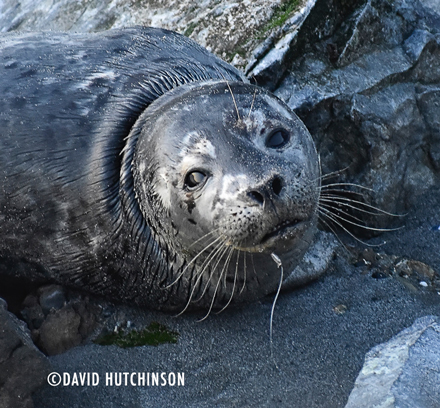
The pups’ proximity to fishing piers and the boat dock made them vulnerable to further entanglement. Seal pups often seek out places with easy fishing. Boat docks and piers are a Mecca for tiny fish - and, unfortunately, also discarded bait and derelict or live line and lures. Several other pups in South and Central Puget Sound have been reported with fishing lures dangling from their mouths, but have yet to be found. Seal pups around fishing piers seldom results in a good ending.
Based on the combined threats of fishing gear entanglement and increased harassment from people, the decision was made to relocate them for their safety.
Seal Sitters First Responders with assistance of SR3 captured the pups Sunday afternoon, just as WDFW Marine Mammal Investigations and World Vets arrived by boat and landed at the point. The pups were quickly transferred, given a medical exam on the boat and taken to a secluded South Sound island. Both pups were tagged with unique ID numbers and marked with green bio paint for easier re-sights in the wild. Seal Sitters is so grateful that the pups could be relocated together.
The rescue and relocation on Sunday was yet another example of the tremendous teamwork of Marine Mammal Stranding Networks SSMMSN and WDFW MMI and our fantastic support groups, SR3 and World Vets. Heartfelt thanks to everyone who gave these two pups a better chance for survival.
The video clip below shows Foxtrot and Tango frolicking in their new waters:
View a more extended video of the rescue and the release into the wild HERE.
SEAL PUPPING SEASON IS IN FULL SWING
Harbor seal pupping season is currently underway in our area and seal pups need to be able to rest onshore. Please remember to stay away from pups, leash your pets, and call Seal Sitters at 206-905-7325 (SEAL) if you see a marine mammal on the beach in West Seattle. For information on who to call in other areas of Washington, click here.
Feeding sea lions and seals is illegal, harmful and dangerous
May/22/17 06:43 PM
The recent British Columbia incident where a California sea lion yanked a young girl off a commercial dock and into the Strait of Georgia has made international headlines. People had been feeding the sea lion bread (most decidedly not a sea lion staple food) minutes before the child’s clothing was grabbed; this, despite numerous signs clearly warning that feeding marine mammals was not permitted. The child, who had been perched on the edge of the pier at Steveston Fisherman’s Wharf, was quickly rescued from the water and did not appear to be injured.
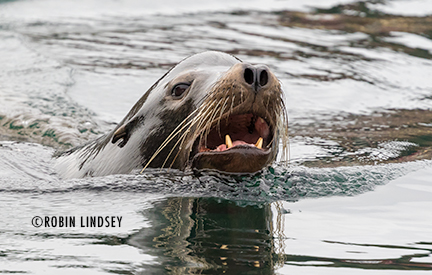 Sea lions are curious, gregarious, lively, loud and large (up to 1000 lbs). It goes without saying that they are wild animals and, as such, are unpredictable in their behavior. The blame for this unfortunate occurrence in Canada does not lie with the sea lion, who likely mistook the child’s light-colored dress for fish.
Sea lions are curious, gregarious, lively, loud and large (up to 1000 lbs). It goes without saying that they are wild animals and, as such, are unpredictable in their behavior. The blame for this unfortunate occurrence in Canada does not lie with the sea lion, who likely mistook the child’s light-colored dress for fish.
The high-profile story has raised public awareness about the hazards this type of feeding interaction poses to humans, but the dangers to marine mammals must not be overlooked.
It is illegal to feed marine mammals in the wild, both in Canadian and United States waters. Marine mammals are protected by U.S. Federal law, Marine Mammal Protection Act, from harm by humans. If you feed or attempt to feed a marine mammal in the wild you put yourself and the animal at risk of injury and may be investigated by NOAA’s Office for Law Enforcement (OLE) for marine mammal harassment.
There are many potential consequences to feeding wild animals. Altering a seal or sea lion’s behavior can prove harmful by interfering with their ability to hunt and feed. If conditioned to approach people and vessels for food, they are at increased risk of injury and death. Marine mammals are wild animals that normally feed on live fish that they hunt and catch on their own.
Feeding marine mammals can cause them to lose their natural wariness of humans or boats and condition them to beg for handouts instead of foraging for their normal prey. They can become sick if they eat food that is spoiled or food that is not part of their normal diet, or they can get injured if they are too close to boats. They may also begin taking bait and catch from fishing gear, risking injury or death by entanglement in or ingestion of fishing gear.
There have been cases of people being bitten by dolphins and sea lions that become aggressive while begging for food, being teased with food by people, or expecting a handout.
Help keep marine mammals safe - and wild. If you observe someone feeding a seal or sea lion, please call OLE’s national hotline at 1-800-853-1964 (information may be left anonymously).
UPDATE 5/28/17
At the urging of marine mammal specialists in media posts, the family was encouraged to seek medical treatment - and did - for mild abrasions suffered in the incident, as bacteria and disease can be transmitted by contact with marine mammals.

The high-profile story has raised public awareness about the hazards this type of feeding interaction poses to humans, but the dangers to marine mammals must not be overlooked.
It is illegal to feed marine mammals in the wild, both in Canadian and United States waters. Marine mammals are protected by U.S. Federal law, Marine Mammal Protection Act, from harm by humans. If you feed or attempt to feed a marine mammal in the wild you put yourself and the animal at risk of injury and may be investigated by NOAA’s Office for Law Enforcement (OLE) for marine mammal harassment.
There are many potential consequences to feeding wild animals. Altering a seal or sea lion’s behavior can prove harmful by interfering with their ability to hunt and feed. If conditioned to approach people and vessels for food, they are at increased risk of injury and death. Marine mammals are wild animals that normally feed on live fish that they hunt and catch on their own.
Feeding marine mammals can cause them to lose their natural wariness of humans or boats and condition them to beg for handouts instead of foraging for their normal prey. They can become sick if they eat food that is spoiled or food that is not part of their normal diet, or they can get injured if they are too close to boats. They may also begin taking bait and catch from fishing gear, risking injury or death by entanglement in or ingestion of fishing gear.
There have been cases of people being bitten by dolphins and sea lions that become aggressive while begging for food, being teased with food by people, or expecting a handout.
Help keep marine mammals safe - and wild. If you observe someone feeding a seal or sea lion, please call OLE’s national hotline at 1-800-853-1964 (information may be left anonymously).
UPDATE 5/28/17
At the urging of marine mammal specialists in media posts, the family was encouraged to seek medical treatment - and did - for mild abrasions suffered in the incident, as bacteria and disease can be transmitted by contact with marine mammals.
Harbor seal pup harassed at Alki Beach - always stay back
Mar/27/17 09:02 AM
(see update at end of post)
A harbor seal pup, trying to come ashore yesterday to get some much-needed rest, was consistently harassed by people and repeatedly scared into Puget Sound. When Seal Sitters MMSN First Responders arrived at sandy Alki Beach, the pup was nowhere in sight. After waiting for about an hour with no sign of the pup, informational signs posted on the seawall above the beach and on the beach itself in hopes it would remind people to STAY AWAY from seal pups.
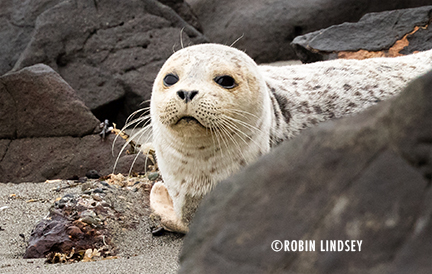 Within a couple of hours, the pup had returned and was trying to come ashore. Once again, a crowd of people stood too close above the pup and scared him in. Thankfully, Seal Sitters’ First Responder Lynn was out for a walk and a check of the beach.
Within a couple of hours, the pup had returned and was trying to come ashore. Once again, a crowd of people stood too close above the pup and scared him in. Thankfully, Seal Sitters’ First Responder Lynn was out for a walk and a check of the beach.
She managed to get people to step away from the edge and the seal pup returned ashore. Lynn set about taping off the small bit of beach. As she was doing so, an off-leash dog was approaching and Lynn firmly asked the owner to please remove her dog, illegally on the beach.
First Responder Robin and Lynn then proceeded to tape off access to the top of the seawall which was directly above the pup, just feet below. Protected Marine Mammal and Seals Need to Rest info signage was placed at intervals to educate the public. The pup settled into small crannies between the black boulders at the end of the beach. As the incoming tide forced her to move in and out between rocks, we would get glimpses of the stunning pup (photo above), who looked relatively robust for a approximately 7 or 8-month old weaned pup. This pup, nicknamed (Saltwater) Taffy seems to be doing better than our most recent weaners who have been using West Seattle’s shoreline.
Despite rainy and cold weather, there were still alot of people out on a Sunday afternoon. As the tide receded late in the day, the skittish pup - anxious due to the earlier harassment - emerged from his rocky hiding place to stay closer to the waterline for an easier escape if necessary. The down side of this is that the pup was now fully visible from the sidewalk above and only about 25 feet from the wall. Seal Sitters could not increase the depth of the perimeter because we could not force pedestrians into the bike lane or street for public safety concerns.
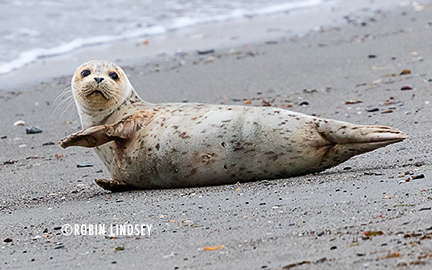 The increased activity and noise of passersby gathering above her, created undue stress for Taffy. Off-duty First Responders Dana and Melinda lent a helping hand and attempted to keep people moving, asking them to observe from the ends of the perimeter, where they had an unobstructed and closeup view as well. You can see in the photo at left that Taffy is visibly stressed by the activity above and behind her.
The increased activity and noise of passersby gathering above her, created undue stress for Taffy. Off-duty First Responders Dana and Melinda lent a helping hand and attempted to keep people moving, asking them to observe from the ends of the perimeter, where they had an unobstructed and closeup view as well. You can see in the photo at left that Taffy is visibly stressed by the activity above and behind her.
The definition of harassment or “take” of a marine mammal as defined by NOAA’s Marine Mammal Protection Act is any human (or domestic dog) presence that causes an animal to change his/her behavior. This most certainly includes the disruption of a seal’s rest and scaring the animal back into the water. ALWAYS STAY BACK from resting seals. Rest is crucial to their survival.
Taffy rested until late into the night as cold and wet volunteers dispersed. During the night, First Responder David tightened up the windblown perimeter, pounding the now-wobbly stakes deeper into the ground and adjusting the length of the tape on the beach to accommodate for the tide.
The pup was gone from the beach at 4:30am and again at 5:30 when volunteers Nicole and Eric checked the perimeter. At 6:30am, Robin arrived the site, but there was still no sign of Taffy. However, shortly afterwards, a river otter came ashore and was doing typical otter behavior of rolling about in the sand - that is, until an off-leash Rottweiler scared him into the Sound. The woman was asked to leash her dog and leave the beach, which she did.
Seal Sitters expects Taffy to return to her chosen haul-out and we certainly expect the public to respect wildlife and share the shore. Stay back, keep dogs and people away and please call Seal Sitters’ hotline 206-905-SEAL (7325) if you see Taffy or any other marine mammal onshore.
PUPDATE 3/29/17
Taffy has been coming and going from this same small stretch of beach at irregular times the past two days. This poses challenges for Seal Sitters First Responders trying their best to ensure she can get the rest she needs, free from harassment. Taffy seems pretty healthy as far as we can tell and we’d like to keep it that way - free from stress, which causes health issues in seals, just as it does in humans.
Seal Sitters relies on the public for reports to our hotline 206-905-SEAL (7325) so that we can respond in a timely manner.
A harbor seal pup, trying to come ashore yesterday to get some much-needed rest, was consistently harassed by people and repeatedly scared into Puget Sound. When Seal Sitters MMSN First Responders arrived at sandy Alki Beach, the pup was nowhere in sight. After waiting for about an hour with no sign of the pup, informational signs posted on the seawall above the beach and on the beach itself in hopes it would remind people to STAY AWAY from seal pups.

She managed to get people to step away from the edge and the seal pup returned ashore. Lynn set about taping off the small bit of beach. As she was doing so, an off-leash dog was approaching and Lynn firmly asked the owner to please remove her dog, illegally on the beach.
First Responder Robin and Lynn then proceeded to tape off access to the top of the seawall which was directly above the pup, just feet below. Protected Marine Mammal and Seals Need to Rest info signage was placed at intervals to educate the public. The pup settled into small crannies between the black boulders at the end of the beach. As the incoming tide forced her to move in and out between rocks, we would get glimpses of the stunning pup (photo above), who looked relatively robust for a approximately 7 or 8-month old weaned pup. This pup, nicknamed (Saltwater) Taffy seems to be doing better than our most recent weaners who have been using West Seattle’s shoreline.
Despite rainy and cold weather, there were still alot of people out on a Sunday afternoon. As the tide receded late in the day, the skittish pup - anxious due to the earlier harassment - emerged from his rocky hiding place to stay closer to the waterline for an easier escape if necessary. The down side of this is that the pup was now fully visible from the sidewalk above and only about 25 feet from the wall. Seal Sitters could not increase the depth of the perimeter because we could not force pedestrians into the bike lane or street for public safety concerns.

The definition of harassment or “take” of a marine mammal as defined by NOAA’s Marine Mammal Protection Act is any human (or domestic dog) presence that causes an animal to change his/her behavior. This most certainly includes the disruption of a seal’s rest and scaring the animal back into the water. ALWAYS STAY BACK from resting seals. Rest is crucial to their survival.
Taffy rested until late into the night as cold and wet volunteers dispersed. During the night, First Responder David tightened up the windblown perimeter, pounding the now-wobbly stakes deeper into the ground and adjusting the length of the tape on the beach to accommodate for the tide.
The pup was gone from the beach at 4:30am and again at 5:30 when volunteers Nicole and Eric checked the perimeter. At 6:30am, Robin arrived the site, but there was still no sign of Taffy. However, shortly afterwards, a river otter came ashore and was doing typical otter behavior of rolling about in the sand - that is, until an off-leash Rottweiler scared him into the Sound. The woman was asked to leash her dog and leave the beach, which she did.
Seal Sitters expects Taffy to return to her chosen haul-out and we certainly expect the public to respect wildlife and share the shore. Stay back, keep dogs and people away and please call Seal Sitters’ hotline 206-905-SEAL (7325) if you see Taffy or any other marine mammal onshore.
PUPDATE 3/29/17
Taffy has been coming and going from this same small stretch of beach at irregular times the past two days. This poses challenges for Seal Sitters First Responders trying their best to ensure she can get the rest she needs, free from harassment. Taffy seems pretty healthy as far as we can tell and we’d like to keep it that way - free from stress, which causes health issues in seals, just as it does in humans.
Seal Sitters relies on the public for reports to our hotline 206-905-SEAL (7325) so that we can respond in a timely manner.
Seal pup repeatedly harrassed while trying to rest
Aug/13/16 12:00 PM
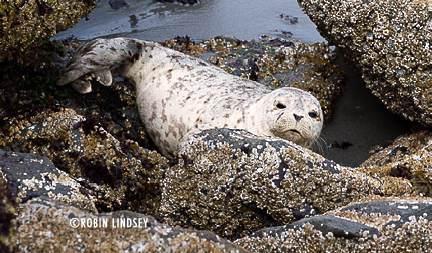
On Friday, the hotline received a call that someone was repeatedly “poking” a harbor seal pup on the beach. Our first responder was on the scene in record time, but both the seal and offender were gone. The seal did not return.
Photos of a seal pup resting at the same location were taken and posted the following Tuesday evening on the West Seattle Blog. The photographer commented that he had to warn people to leave the pup alone. Unfortunately, no one called the Seal Sitters’ hotline that day to ensure the pup’s safety.
SSMMSN’s first responders were out early on Wednesday morning, checking the beach to see if the seal might be onshore. The sand was empty, but they could see a glossy little head about 100 yards out from the pier, where the pup appeared to be foraging. The pup came ashore around 10am, nestling in the barnacle covered rocks below the sea wall (photo above). Access to the small pocket beach was promptly closed off with tape and informational signage that seals are protected by Federal law from harassment and harm.
Seal Sitters volunteers worked in shifts to answer questions from the public, educating hundreds about seal pups’ urgent need for rest against just 50% odds of survival their first year. The pup, nicknamed Seamor by a young volunteer, snoozed for many hours in the warm sun. As evening approached, the incoming tide and a large series of waves from a passing ferry headed for Bainbridge Island, swept over Seamor and the pup reluctantly headed out into the Sound.
Someone mentioned witnessing a person “lying on top” of the pup the day before. When the person finally got up and off, the frightened seal escaped into the water.
If you witness a marine mammal illegally being harassed, please take a photo to document the incident (do not put yourself at risk!) and contact NOAA’s Office of Law Enforcement @ 1-800-853-1964. In West Seattle, please call Seal Sitters, a member of NOAA’s West Coast Marine Mammal Stranding Network, first so we can get on the scene.
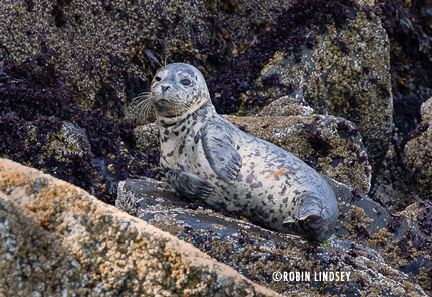
Somehow, though all the human chaos, Seamor did manage to get some sleep and rested under the watchful eye of Seal Sitters and rapt onlookers who peered into the spotting scope, allowing a closeup view of the white-coated pup. Around 9pm on this stunning evening, as the sun dropped behind the silhouette of the Olympic Mountains, Seamor finally flopped across the beach and disappeared into waves.
On Friday, expecting the pup’s return to that northernmost point of West Seattle, volunteers stood by. However, the area was busy with people walking and standing along the sea wall and there was very little beach to rest upon. We sighted a seal head glimmering offshore. Then, to our surprise, Seamor hauled out over 1/2 mile around the bend. Volunteers once again protected the beautiful little pup who snoozed until after 9pm. After waiting about 20 minutes to make sure there was no return trip to shore, tired volunteers gathered up stranding materials and finally went home to eat a very late dinner.
Seamor seems to be a pretty healthy pup, estimated to be about 4 weeks old and recently weaned. Wet rings around the eyes indicated that the pup is well-hydrated. The health of a pup can quickly take a downturn if not allowed to rest. Please make sure to call Seal Sitters hotline @ 206-905-SEAL (7325) promptly if you see a seal pup - or any marine mammal - onshore.
Seal pupping season in full swing - stay away from seals and pups!
Jul/10/16 07:17 PM
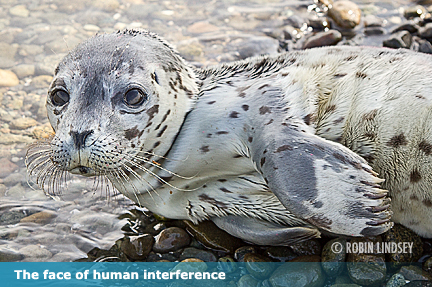
Nursing pups, however, are dependent on their moms for survival for the first 4-6 weeks of their lives. In the waters of Central and South Puget Sound, pups are born from late June through the first week of September (view a map of pupping season in WA). Always stay far back from any pup you come across.
A harbor seal mom, shy and wary of humans, will abandon her pup if people and dogs are around. Use common sense and help protect wildlife from harassment and abandonment.
YOUR PRESENCE CAN CAUSE STRESS AND ABANDONMENT
As you head for the beach, know that seashore revelry is definitely no party for harbor seal pups, who are seeking to rest onshore. Humans and dogs cause pups to be abandoned every year. A harbor seal mom often will not return for her nursing pup if there is a disturbance or perceived threat. It goes without saying that July fireworks cause animals to be abandoned every year.
If you find a spot for your picnic on a beach near a harbor seal, please move your picnic to another beach. There are reports of people with blankets and coolers surrounding a lone seal pup - finally calling the stranding network wondering why the mother did not return.
Weaned seal pups need space to rest undisturbed as well. A pup that is scared into the water wastes precious calories - and this can truly be the difference between life and death.
This is a reminder that when you venture out to the beach, whether by trail or boat, please respect animals’ space and need for quiet. Stay back!
SEALS ARE PROTECTED BY LAW FROM HARASSMENT
Please stay a minimum of 100 yards away from resting seals. Like all marine mammals, they are protected from harassment by the Marine Mammal Protection Act and Washington State law RCW 77.15.130 (a criminal misdemeanor, mandatory court appearance, punishable with up to 90 days in jail and up to $1000 fine).
STAY FAR AWAY FROM HARBOR SEAL HAUL-OUTS
Harbor seals gather in large groups this time of year at haul-outs (called rookeries during pupping season), where moms and pups find safety in numbers. Pups pay a terrible price for human disturbance. The seal pup shown above was found in 2012, starving on Cutts Island, along with two other emaciated pups and several dead ones. All had been abandoned by their mothers because boaters disrupted the seal colony on this small South Puget Sound island near Gig Harbor. Durning boating season, thousands of boats can be moored offshore at Cutts, disrupting this historic harbor seal haul-out.
A day of boating fun for people can be a death sentence for seal pups. When you are boating or kayaking, please stay far away from resting harbor seals.
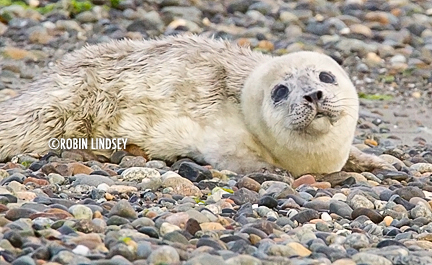
Please contact the stranding network to respond to a lanugo pup.
RESPECT NATURE AND STAY BACK
Leave seal pups be - don’t touch, move or feed them. If you are concerned about a pup, call the NOAA hotline @ 1-866-767-6114. To learn more about harbor seals and pups, visit Seal Sitters website here.
Seal pupping season now underway on Washington's outer coast
May/25/15 08:00 PM
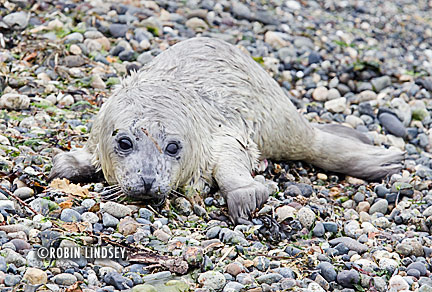
Seal Sitters has also received a report of a live lanugo birth in a South Puget Sound island rookery. Inside the womb, pups have a wavy white coat known as lanugo. For a full-term pup, this long fur is shed before birth. If a pup is born prematurely (with a partial or full lanugo coat), his muscles and lungs will not be fully developed and survival rate is extremely low. The amount of lanugo fur indicates the stage of prematurity.
The photo shown here is of lanugo pup Luigi, born last June on West Seattle’s Alki Beach. A man with a dog was on the beach next to the pup when Seal Sitters first responders arrived. After convincing him he was jeopardizing the survival of the pup, responders cleared the beach and established an extensive tape perimeter, restricting access to the area in hopes that the pup’s mom might return. She was not seen again. A full month premature and weighing only 5.5 kg, she had to be humanely euthanized after 2 days.
At the South Puget Sound rookery on Saturday, WDFW’s marine mammal biologist reports that a boat full of people illegally breached the closed harbor, speeding toward the seal colony where this latest lanugo pup had just been born. The frantic seals were scared from the haulout, leaving the premature pup alone. It is assumed the pup died due to abandonment. Photos of the boat with license number and occupants have been sent to NOAA’s Office for Law Enforcement (OLE) for investigation. If you witness harassment of seals or other marine mammals, a violation of the Marine Mammal Protection Act, please call the OLE Hotline at 1-800-853-1964.
PLEASE, stay back from harbor seal haulouts, where seals gather in numbers - especially during pupping season, now through the end of October in Washington State! It is truly a matter of life and death for seal pups. Observe quietly from a distance. For a map showing pupping timeframes in various parts of the state, click here.
Rescue of seal pup challenges first responders
Jan/07/15 08:15 AM
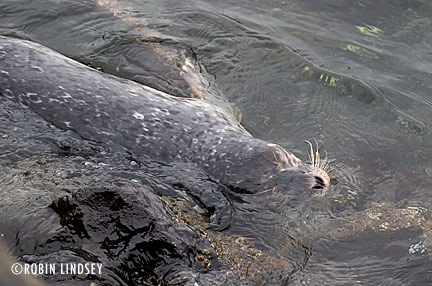
Returning briefly to her car to escape a drenching downpour, Robin peered through the window with steamy binoculars and noticed a hint of movement in the waves underneath the cement overlook. It was the harbor seal pup, listless in the swells surging against the rocks.
This pup, floating just offshore in the deep water, was obviously in dire straits. Over the next 90 minutes, she observed the odd behavior of the inaccessible, struggling pup who opened her eyes only briefly during that entire time, even when battered on the craggy point. Robin called fellow First Responders Lynn and David to plan and participate in a tricky and precarious capture attempt. Disappearing at times and too weak to haul out onto the rocks to rest, the pup finally became wedged into the base of the rocks by the rising tide. If Seal Sitters was going to be able to capture her, this was our brief moment of opportunity.
All three volunteers carefully maneuvered down the slippery, steep rocks below the sea wall. At the base, Robin positioned a large net behind and underneath the exhausted pup, half-draped into the somber, gray water. After letting the pup rest for a few minutes, she was scooped into the net and carried high up onto the grass above. The female pup was gently transferred into a kennel and driven to PAWS Wildlife Center for stabilization and assessment, but we are sad to report that she died overnight.
The pup will be necropsied by WA Department of Fish and Wildlife Marine Mammal Investigations in hopes of determining cause of death. We will follow up and post the results of that exam.
Seal Sitters MMSN would like to commend the man who stopped his truck and questioned our authority to handle a marine mammal. He was assured that we are indeed contracted members of NOAA’s West Coast Marine Mammal Stranding Network and, as such, are authorized to examine and transport a seal to a rehabilitation center for treatment. Seal Sitters MMSN would like to remind everyone that ONLY members of the Marine Mammal Stranding Network - or their assigned agents - have this authority. Any member of the public that feeds, touches, moves or disturbs a marine mammal can be fined and/or prosecuted under the Federal Marine Mammal Protection Act (MMPA) and Washington State law.
Seal Sitters MMSN renews contract with NOAA
Aug/29/14 01:19 PM
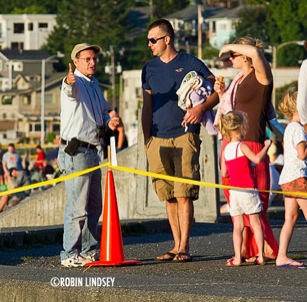
This legally binding agreement gives SSMMSN the authority to respond to marine mammals, dead and alive, along the shoreline of West Seattle from Brace Point through the Duwamish River (including Harbor Island). It gives us the jurisdiction to examine and transport marine mammals.
Seal Sitters has the authority to close down access to public areas and establish appropriate perimeters around marine mammals to ensure not only their protection, but that of the public.
All marine mammals are protected from harassment by both the Federal Marine Mammal Protection Act (punishable by fines up to $10,000 and one year in jail) and Washington State law RCW 77.15.130 (a criminal misdemeanor, mandatory court appearance, punishable with up to 90 days in jail and up to $1000 fine). In cases of disturbance or harassment (including feeding, touching, moving), SSMMSN will document infractions and turn over evidence to NOAA’s Office for Law Enforcement and Washington Department of Fish and Wildlife Enforcement for prosecution. If deemed necessary, the local police will also be contacted.
As part of our responsibility, dead marine mammals are examined and documentation is entered into NOAA’s national database. In some instances, animals may also be taken for necropsy. If a marine mammal is not a candidate for necropsy and is on public beach, SSMMSN will arrange for removal through our cooperative arrangement with Seattle Parks. If the dead animal is on private property, disposal is the responsibility of the homeowner.
Please report ALL live and dead marine mammals on both private and public beach to Seal Sitters’ hotline 206-905-SEAL (7325) so that we may help monitor the health of populations. SSMMSN does not receive any funding from local, State or Federal government and depends on donations to perform our work.
Pupping season hits West Seattle with two seal pups in two days
Aug/19/13 10:15 PM
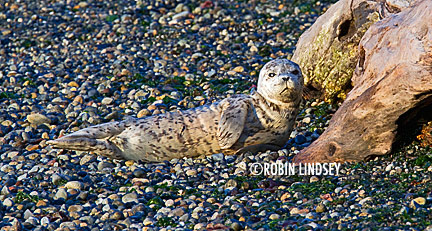

This afternoon the hotline rang with a call about a pup on the steps at Emma Schmitz Viewpoint Park. Thanks to reporting party Melissa for protecting the pup until we arrived. The thin pup was on the bottom step with the tide lapping against her and returned briefly to the Sound, only to emerge moments later on a very small stretch of beach right next to two young people. Quickly gathering up their belongings, they left the beach to give the pup some much-needed space. Photos of the yawning pup revealed fully erupted teeth, indicating she is no longer nursing on mom’s rich milk.
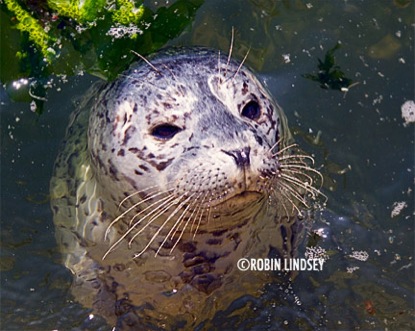
Nicknamed BellaBaby, shown here taking a brief dip in the cool Sound on this hot afternoon, the pup rested until after dark under the protective watch of volunteers. Thanks to all our dedicated volunteers who have put in very long hours the past two days (and nights)! These newly weaned pups need all the help they can get from a respectful public in their struggle to survive without mom. Stress-free rest is critical.
PUPDATE (8/20/13 7:31am)
BellaBaby was still resting on the beach this morning as the tide was receding. She may well spend several more hours there, gaining strength before returning to forage and, hopefully, pack on some much-needed blubber.
Seal pup Sparkle, victim of human interference, taken to rehab
Aug/05/13 06:01 PM
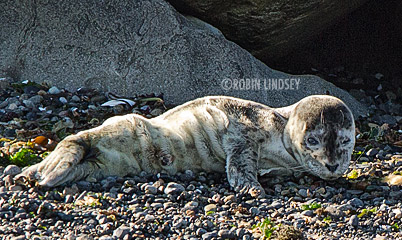
First responders David and Eilene kept watch through their scope last evening, trying to determine if mom might return to nurse her pup, but Sparkle was still alone at 9pm. They saw her leave the raft and, luckily, a neighbor noticed the pup come ashore on the private beach, quickly alerting our volunteers. Under cover of darkness and incoming tide, the pup would be relatively safe for the night. At 5am, lead investigator Robin found Sparkle sound asleep in the same spot and began the process of arranging her rescue - a call to PAWS to ensure they had space, emailing health assessment photos to WDFW’s Dyanna Lambourn for consult and lining up volunteers Lynn and Lars to assist in the capture.
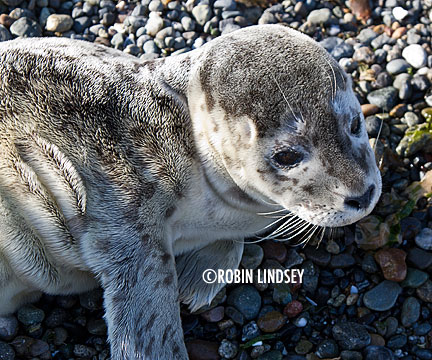
Thankfully, the pup came ashore and we were able to capture and transport her. There is no guarantee the emaciated pup will survive - and because of people’s insensitivity and carelessness, even after months of fattening up in rehab, Sparkle will not have learned valuable life lessons from mom, such as how to forage successfully and interact with other seals.
PUPDATE 7:30pm
PAWS confirms that Sparkle is female and weighs a mere 6.6 kg. Despite a bloody umbilicus there appears to be no infection, but she has multiple punctures on her hind flippers. We will keep you updated about Sparkle’s progress.
9/9/13
Sparkle was euthanized at PAWS this morning. Veterinarian Dr. John Huckabee believes Sparkle’s immune system was not functioning properly, as she struggled the entire time she was there with digestive issues, ear and other infections and a heart murmur.
Boat harassment endangers life of newborn seal pup - stay back!
Aug/04/13 07:43 AM
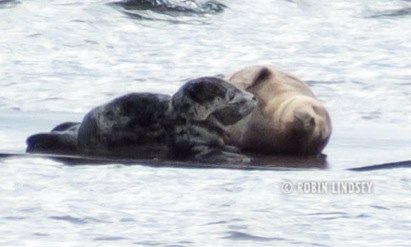
What we’re certain of now, however, is that the pup is between 4-10 days old. Based on our photo obtained yesterday, showing a shred of umbilicus still attached, WDFW’s marine mammal biologist estimated the age is closer to 4 days. Because of the high disturbance yesterday of racing outrigger canoes and boat traffic, the adults quickly abandoned the platform yesterday morning, leaving newborn Sparkle and a larger yearling as the sole occupants. The adults never returned and as of late last night, the platform was empty.
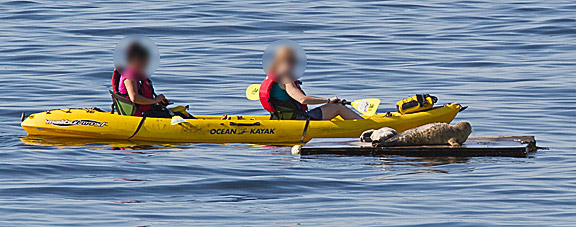 Throughout the day, a steady stream of kayakers and boaters came way too close to the platform, some within only a few yards - harassment in the eyes of NOAA Office for Law Enforcement (OLE) and a violation of the Marine Mammal Protection Act. Stay back from all resting seals, whether on rafts, docks, buoys or shore. Incidents (such as the one shown of two kayakers) are being documented and photographic evidence of violations will be sent to OLE for investigation. Violations are punishable by fine and severe violations are punishable by jail time. Read more about boater guidelines here.
Throughout the day, a steady stream of kayakers and boaters came way too close to the platform, some within only a few yards - harassment in the eyes of NOAA Office for Law Enforcement (OLE) and a violation of the Marine Mammal Protection Act. Stay back from all resting seals, whether on rafts, docks, buoys or shore. Incidents (such as the one shown of two kayakers) are being documented and photographic evidence of violations will be sent to OLE for investigation. Violations are punishable by fine and severe violations are punishable by jail time. Read more about boater guidelines here.What’s all the fuss? Adult harbor seals have learned of the dangers of humans and dogs and are very wary of disturbance. If there is too much activity around a mom’s pup, she may flee the area and abandon him. Because of the constant activity around the platform, this tiny pup who cannot survive on his own, may have been given a death sentence by boaters who insisted on coming too close - potentially permanently scaring the mom away. Human interference has dire consequences for seal pups, often resulting in death.
We want the seals to be able to depend on use of this lone platform (until recently, there were two more providing sanctuary at this location) to rest and regulate their body temperature. Undisrupted, stress-free rest is critical to their survival. If they are chased from this safe refuge, they must turn to the beach - with the dangers of off leash dogs and unwitting beach-goers. This tiny pup would be helpless alone on the beach without a mother’s protection. Please respect seals’ space and stay back 100 yards whenever possible. This also includes people observing the platform from shore - please watch from a distance and not directly across from the seals which causes undue stress. If you’d like information on building an off shore platform to help wildlife survive, please contact us.
Don't touch seal pups! Rash of illegal pickups endanger pups
Jul/14/13 07:12 AM
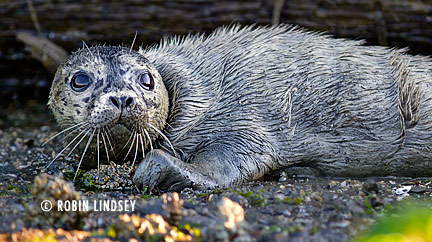
It is against Federal law, the Marine Mammal Protection Act, to touch, feed or move a seal pup. Violations are subject to stiff fines and can include jail time, depending on the severity of the crime.
One of the most common wrong assumptions that people make is thinking that a pup needs to be in the water, not on shore. Pups haul out to rest and warm up from our very frigid Northwest waters. Never return a pup to the water. They need to rest - on beaches, log booms, docks - even, occasionally, passing kayaks and paddle boards. Never cover a pup with a blanket - they can overheat and suffer brain damage.
During pupping season (June - September in South Puget Sound), it’s not unusual for a pup to suckle rocks or logs when mom isn’t around. The newborn pup shown here, with a long, white lanugo coat usually shed in the womb, was suckling on rocks and calling for mom, who returned to tend to her offspring. A newborn will still have a bit of the umbilicus cord protruding. It is not an “injury” as many people think and usually falls off after a week or so. If you see a pup you are concerned about, call the stranding network - don’t touch or try to feed the pup.
Share the shore. If you see a seal pup, stay back - 100 yards whenever possible. The best chance a pup has for survival is to stay in the wild, undisturbed by humans. If a pup is under 4-6 weeks old and is alone on the beach, almost always mom is nearby. If she sees people or dogs (a significant danger) too close, she may well abandon the pup who cannot survive without her. A pup taken to rehab does not have nearly the chance to make it back in the wild as a pup who remains there with mom, learning how to forage and gaining immunity from disease while nursing on her rich milk. Even then, pups have a 50% mortality rate their first year.
Never take a pup from the beach. Only members of NOAA’s Marine Mammal Stranding Network or NOAA authorized personnel can transport a marine mammal. A pup taken illegally from the beach to a wildlife facility, by law cannot be treated until approved by NOAA. While you may think you are saving a pup, instead you are gravely endangering him. Being removed from the beach, handled and put into a car can cause life threatening stress. Please don’t disturb resting seal pups. If you are concerned about the health of an animal or if there is harassment by people or dogs, call the NOAA hotline @ 800- 853-1964 or the Seal Sitters hotline @ 206-905-7325 (SEAL) and we will direct you to the proper standing network for response.
Sea lion harassment will be reported to NOAA law enforcement
Mar/31/13 09:11 AM
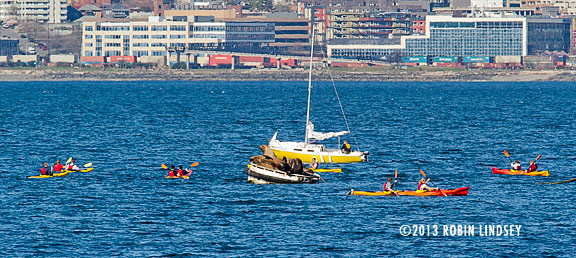
Fair warning to all recreational boaters, including kayakers:
Any harassment of the sea lions resting on the Elliott Bay buoys is being photographed and sent to NOAA’s Office for Law Enforcement. The Marine Mammal Protection Act (MMPA) prohibits harassment of marine mammals. Stay 100 yards away from any marine mammal resting on shore, buoys, or in the water. It is against Federal Law for boaters to be as close as shown above, taken yesterday afternoon.
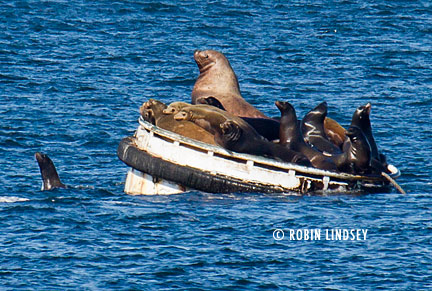
A highlight to any day in West Seattle is to get out on the water and enjoy wildlife. If you don’t have a boat or kayak, you can rent one at Alki Kayak Tours. Please comply with the MMPA as you enjoy your boating activities and observe these majestic animals from a respectful distance. This also includes resting seal pups along our shoreline. Resist the temptation to get close. All pinnipeds require time out of the water to rest and regulate their body temperature - it is critical to their health and survival.
If you see a violation and are able to take a photo, try to get a boat license number if at all possible and email photos to us. We will forward to Office for Law Enforcement.
Offshore rafts save seal pup lives - keep your distance
Sep/17/12 07:27 PM
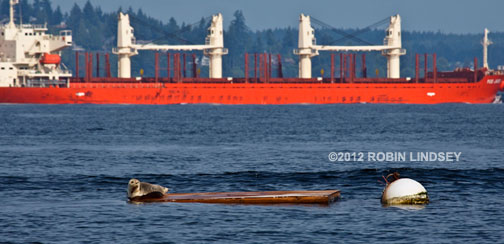
In our urban areas, with crowded beaches, they will “haul out” on a platform instead of the beach if one is around. While a platform keeps them safe from dogs and beachgoers, it does not keep them safe from harassment by curious kayakers and paddle boarders. We have been hearing reports of people in water craft causing pups to abandon the rafts. Not only are people to stay back from marine mammals on shore (NOAA guideline is 100 yards), but also in the water, as clearly stated by the Marine Mammal Protection Act. Altering an animal’s behavior is considered a violation of this Federal law. Please observe these resting pups from a distance. We do not want them scared off the platforms and come ashore, where they are much more vulnerable to disturbance or injury. Many of these pups are very thin and don’t have calories to spare, burning them unnecessarily. Please stay back - you can save a life!
If you own waterfront property and would like information on building a raft (we can provide plans), please email us.
Respect harbor seal haulouts - it's life and death for seal pups
Aug/12/12 08:58 PM
Boaters, kayakers and jet skiers: Please be aware that locations where harbor seals gather are sensitive and vital areas - and disturbances to seal colonies can be devastating for newborn pups. Many Puget Sound islands have state parks with seal haul outs, where the animals gather in numbers to rest and, this time of year, give birth and nurse their young. Adult harbor seals are extremely skittish and the slightest disturbance can cause a stampede into the water, often leaving vulnerable pups alone on shore. If people land watercraft or swim or picnic close to a pup, the mom may well abandon him. On a state park island last year, WDFW Marine Mammal Investigations’ biologist found a group of picnickers surrounding a pup and was told they were “waiting for the mom to return.” It is no surprise that the mom never did.
This week, our lead responder accompanied that biologist on observations of South Puget Sound harbor seal rookeries. Responding to a report of a dead seal pup on that same small island with a known seal colony and a history of conflict with recreational boaters, we found two dead pups as well as three that were emaciated and weak, but alive - and several boats and a number of people way too close. We were told that just before we arrived a man tried to put one of the pups back into the water (one of many instances, we are sure). There is no chance a mom will return to take care of her pup under these circumstances. At right is a photo which shows the tiny island on a typical August day - a virtual flotilla of boats and people (click on the Google Earth photo to enlarge). There are reports of 100 boats at this island on a weekend.
This video shows seals fleeing from a nearby South Puget Sound rookery - as an eagle lands near them. You can imagine their terror when a boat lands on their beach.
Enforcing the Marine Mammal Protection Act in remote areas is challenging. Park rangers are few and far between and access to respond to islands is especially difficult. Signs that are posted are either torn down or graffitied beyond recognition. It appears that too many humans feel that their “right” to be in nature supersedes animals’ rights to survive in their daily life and death struggle. We are dependent upon the public to spread the word that no matter where you are, if you encounter a marine mammal on the beach, you are to stay 100 yards away. If someone is harassing a pup on the beach, call Seal Sitters’ hotline @ 206-905-7325 (SEAL) immediately and we will contact the proper authorities. Take a discreet photo of a boat showing license number - NOAA Office for Law Enforcement has a better chance of prosecution with physical evidence. Do not put yourself in harm’s way. If you find a pup that appears to be abandoned, keep your distance and call the hotline.
This week, our lead responder accompanied that biologist on observations of South Puget Sound harbor seal rookeries. Responding to a report of a dead seal pup on that same small island with a known seal colony and a history of conflict with recreational boaters, we found two dead pups as well as three that were emaciated and weak, but alive - and several boats and a number of people way too close. We were told that just before we arrived a man tried to put one of the pups back into the water (one of many instances, we are sure). There is no chance a mom will return to take care of her pup under these circumstances. At right is a photo which shows the tiny island on a typical August day - a virtual flotilla of boats and people (click on the Google Earth photo to enlarge). There are reports of 100 boats at this island on a weekend.
Enforcing the Marine Mammal Protection Act in remote areas is challenging. Park rangers are few and far between and access to respond to islands is especially difficult. Signs that are posted are either torn down or graffitied beyond recognition. It appears that too many humans feel that their “right” to be in nature supersedes animals’ rights to survive in their daily life and death struggle. We are dependent upon the public to spread the word that no matter where you are, if you encounter a marine mammal on the beach, you are to stay 100 yards away. If someone is harassing a pup on the beach, call Seal Sitters’ hotline @ 206-905-7325 (SEAL) immediately and we will contact the proper authorities. Take a discreet photo of a boat showing license number - NOAA Office for Law Enforcement has a better chance of prosecution with physical evidence. Do not put yourself in harm’s way. If you find a pup that appears to be abandoned, keep your distance and call the hotline.
Human interference a serious threat to seal pups
Sep/13/11 08:40 AM
Seal Sitters has responded to two incidents the past few days involving human interference in the Everett area, both by well-meaning but misguided folks. Never pour water or place clothing or towels over seal pups. Material placed over a struggling pup can cause severe health consequences from over-heating. It is a federal offense to touch, move or feed a marine mammal as written into the Marine Mammal Protection Act of 1972. Keep your distance from a seal pup or seal on the beach and call the stranding network or NOAA Hotline. Violators will be prosecuted or heavily fined by NOAA’s Office for Law Enforcement.
 In West Seattle over the past few days, we had two incidents of off leash dogs with owners who flagrantly violated the “no dogs on beach” ordinance - with the knowledge that there was a seal pup on the beach. In the case yesterday, a woman running on the beach refused to control and leash her dog, even after being informed that we had a very small pup on the rocks. As they ran by, seal pup Henry was scared and fell deep into a hole in the rocks, distressed and apparently stuck. As our volunteers scrambled to assess how to intervene for a rescue if necessary, Henry managed to free himself and crawl out onto the beach. Our volunteers remained on the beach to prevent any further incidents. Every year dogs maul or kill seal pups in the Northwest. All persons willfully violating the MMPA will be reported to NOAA Office for Law Enforcement. A violation includes an act by a human that in any way alters the behavior of a marine mammal - including causing them to relocate. Seal Sitters tries our best to maintain a reasonable perimeter so that a pup may rest undisturbed in a very urban environment. Please be respectful of seals’ need to rest onshore!
In West Seattle over the past few days, we had two incidents of off leash dogs with owners who flagrantly violated the “no dogs on beach” ordinance - with the knowledge that there was a seal pup on the beach. In the case yesterday, a woman running on the beach refused to control and leash her dog, even after being informed that we had a very small pup on the rocks. As they ran by, seal pup Henry was scared and fell deep into a hole in the rocks, distressed and apparently stuck. As our volunteers scrambled to assess how to intervene for a rescue if necessary, Henry managed to free himself and crawl out onto the beach. Our volunteers remained on the beach to prevent any further incidents. Every year dogs maul or kill seal pups in the Northwest. All persons willfully violating the MMPA will be reported to NOAA Office for Law Enforcement. A violation includes an act by a human that in any way alters the behavior of a marine mammal - including causing them to relocate. Seal Sitters tries our best to maintain a reasonable perimeter so that a pup may rest undisturbed in a very urban environment. Please be respectful of seals’ need to rest onshore!

